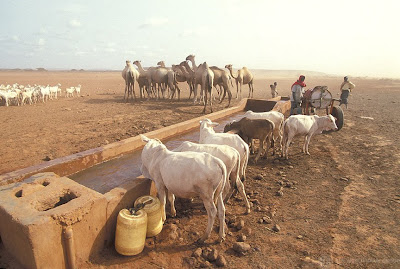 In a previous post we reported on how Kenyan citizens conducted social audits to oversee the distribution of discretionary funds intended for community projects. This post looks at how citizen engagement in Kenya has helped to improve quality in water provision through citizen watchdogs called Water Action Groups. These are a spinoff of the Citizen Report Card project, a tool that assesses service provision in water and sanitation.
In a previous post we reported on how Kenyan citizens conducted social audits to oversee the distribution of discretionary funds intended for community projects. This post looks at how citizen engagement in Kenya has helped to improve quality in water provision through citizen watchdogs called Water Action Groups. These are a spinoff of the Citizen Report Card project, a tool that assesses service provision in water and sanitation.
I saw Rosemary Rop of the World Bank’s Water and Sanitation Program present lessons from this project this Tuesday in Washington. Her presentation was part of the World Bank’s Demand for Good Governance speaker series.
The Citizen Report Card provides evidence-based data which deepens the understanding of the underlying issues, and links policy makers, citizens and service providers. This tool is survey-based with systematic feedback from users (mainly data on consumers’ perceptions). The data was collected for Kenya’s three largest cities: Nairobi, Mombasa and Kisumu using local civil society groups partnering with the World Bank Institute.
The data gathered helped develop programs to address the salient issues, called Action Plans. The results were used to carry out informed dialogue for improvement of services. Rop mentioned the Citizen Report Card has given citizens the ability to inquire about progress on the “Action Plan” and thus track their progress. Citizens became organized into “Water Action Groups” that conducted the Action Plan Reviews.
Eventually the Kenyan Water Services Regulatory Board started to institutionalize the citizen feedback process. This led to the creation of a national level umbrella CSO network, Kenya’s Water and Sanitation CSO’s Network (KEWASNET) to monitor governance issues in this sector and to engage policy makers and experts in this issue.
Clear information on progress + grassroots organizing = accountability. We like it.
Have water and sanitation services improved in Kenya? Rop says they have, although the Citizen Report Card is just one element of the solution. As mentioned at the event, capacity building is a long process and reforms take time to be fully implemented.
More from Rosemary Rop on the linkage between accountability and service delivery here. More on accountability in Kenya in the Global Integrity Report: Kenya.
— Renato Busquets
— image: Curt Carnemark / World Bank (cc by/nc/sa)





